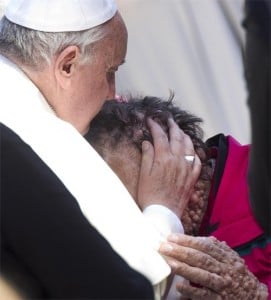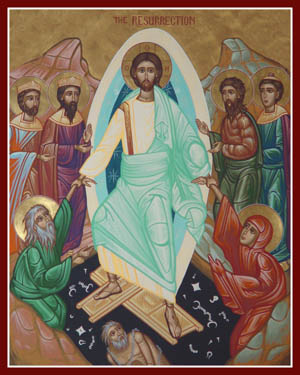It looks like Atonement is entering the orbit of the blogosphere again. Here is another post from Tony Jones and a response from Chris Rosebrough. Scott Paeth continues with a different set of interesting questions.
Usually what happens is a misunderstanding of the teaching of the Church Fathers in order to support a view that is simply not there. usually this is in order to support the notion of Penal Substitutionary Atonement. The Orthodox Church does not teach this and neither did the Church Fathers. Here is another way to look at the issue that might help.
The primary issue is over when the punishment for sin will actually take place. For the classic “Western” view the punishment is an event that occurs after we die. Whether this is based on solely God’s initiative as we read in various forms of predestination or based on works, the problem is when the punishment happens and what that punishment means. In short, if we don’t accept Jesus and his punishment in our place, we are in deep trouble after we die; Satan can have his feast on us.
That’s not how the Church Fathers even viewed reality. Death itself is the punishment of our fallen nature. Death is simply not our natural state. The act of Jesus dying and rising from death restores human nature to its proper condition.
Even more than this, Jesus by raising from the dead destroys Satan’s power over us. Satan’s tool to hold us in fear is the prospect of death and becoming his own. Satan’s power has been eradicated and it is up to us and how we use our free will to live in the fact that he has no real power over us unless we choose it.
The Incarnation and ministry of Jesus fulfill Adam’s failure to steward the earth with Eve his partner; he chose Satan and death instead. Jesus’ death and resurrection defeat the consequence of Adam’s failure which was choosing to bring death into the world.
Death is the result of the spiritual sickness humanity and all of nature are born into. It is through spiritual discipline and participation in the sacraments that we all have the opportunity to be restored. This is the true act of renouncing the world and sin which is an ascetic struggle. All of this is to prepare us to meet God which all of humanity will do not out of their own choosing. This will be glorious for some and terrible for others who are not prepared.
This is the teaching of the saints which is clearly written in the context of the Philokalia. This set of works contains the writings that inform the theology of the Eastern Church. At Pascha (Easter) we sing this simple verse in the Divine Liturgy that sums up the significance of Jesus’ death and resurrection:
Christ is risen from the dead
Trampling down death by death
And upon those in the tombs restoring life.
I think the West continues to need the teaching of the East to set the record straight.











